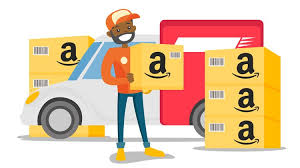
The Ultimate Guide to Selling on Amazon Via FBA in 2020
So you have heard about how profitable it can be to start selling on Amazon with their fulfillment services. Just exactly how can you do this? Read on!
The main reason people get on board selling with Amazon FBA is that it makes managing an online retail business so much easier.
Amazon helps to take care of all the nitty-gritty details that comes with managing the logistics aspect of your business.
Be it that you are launching your own brand (Private Label), flipping items (Retail Arbitrage) or utilizing the wholesale model, you will find that Amazon FBA ease the logistics process.
It is also possible to sell on Amazon USA even if you are living outside of the US. As long as you have a business set up in one of the following countries accepted by Amazon in this list. Even if your country does not appear on that list, fret not. You can still set up a business entity in one of those countries.
In this section, I will be focusing on:
- What is FBA?
- The FBA Process
- Pros and Cons of FBA
- Fees of FBA (And some Hidden Fees)
Table of Contents
What is Fulfillment by Amazon?
FBA in short stands for “Fulfillment By Amazon” and as stands, it literally means Amazon will fulfill (Pack and Deliver) any orders you receive.
Essentially, sellers like you send in their inventory to an Amazon warehouse and distribution centers close to the customers. Those products are stored in those centers until they are purchased by a customer on Amazon.com.
Amazon is well known for the world class global logistics capabilities and is the gold standard in the industry when it comes to fulfilling delivery.
Amazon has used that edge (Logistics Capabilities) to lead people to expect near instant gratification that only it could deliver.
The short summary is that FBA is a storage and distribution service coupled with basic customer service which Amazon offers to sellers at a small fee.
The FBA Process
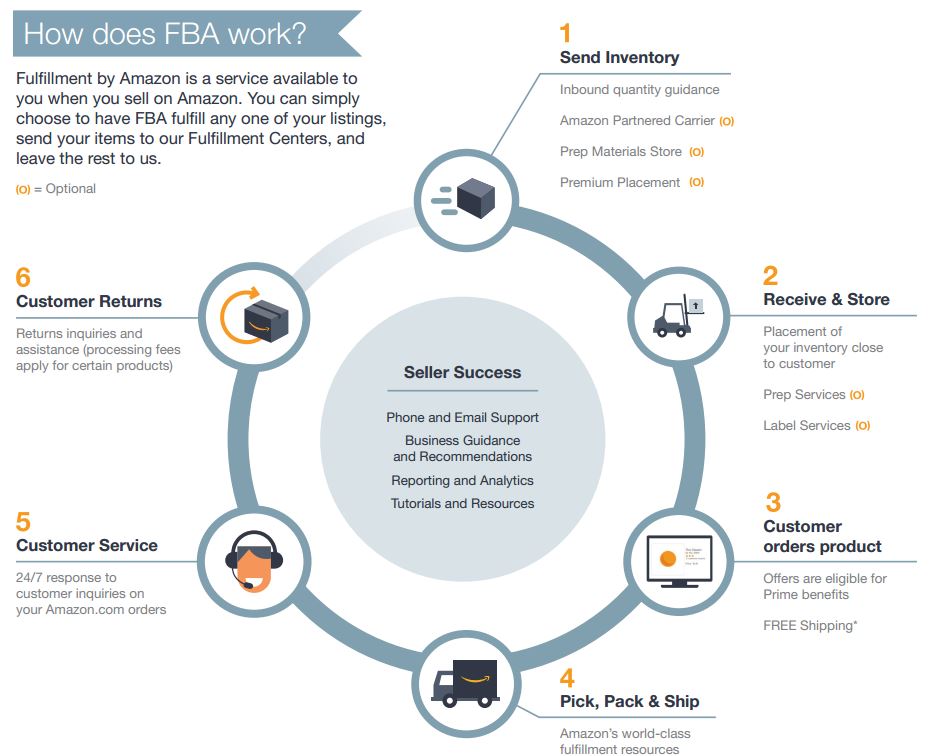 Image courtesy of Amazon.com
Image courtesy of Amazon.com
Sending Inventory
Send your products directly from your home or your supplier’s factory while adhering to Amazon’s FBA guidelines. You role here would be to:
- Set Shipping Plan in your Seller Central Dashboard
- Label (Amazon can do this for a small fee; or your supplier can do this)
- Pack (Your supplier can do this)
- Ship to Designated Amazon Fulfillment Center/s (Your supplier can do this)
So really, if you chose the route of sourcing from a supplier, your role in this step is just to set up the shipping plan)
Usually, Amazon will direct you to ship your inventory to multiple fulfillment centers.
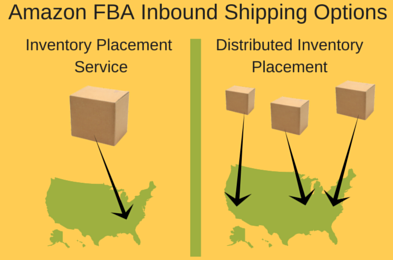 With Placement Service vs Distributed Inventory Placement
With Placement Service vs Distributed Inventory Placement
For example, you have 1,000 teddy bears. (Not saying that’s the best item to sell) Your Seller Central will get you to ship 500 bears to warehouse A in Dallas, Texas, while 200 bears will go to Warehouse B in LA, California and the remaining 300 bears to Warehouse C in Brooklyn, New York.
You can avoid sending your shipment to multiple warehouses by enabling “Placement Service” which is where you will ship your 1000 teddy bears to warehouse A. Amazon will take care of the rest of the distribution with a small per unit item fee. (Usually its US$0.20/unit)
Amazon Receives & Store
As soon as your product reaches the warehouse, Amazon sorts out your inventory. If you have enabled “Placement Service” on your seller central, Amazon will send it out to different distribution centers they think will have the best demand for your product.
Once it is properly entered into Amazon’s database, you will see on Seller Central the number of units Amazon have received and your listing becomes active!
Customer Orders Your Product
Hurray! You got an order from a customer! This item is immediately processed and prepared for shipping out by Amazon. You don’t have to do anything, but just wait for Amazon to do its fulfillment service.
If you are selling on another platform other than Amazon.com (eBay, your own website etc) then you can select “Multi-Channel Fulfillment” option for Amazon to ship the product out for you as per your request.
Delivery and Tracking
At this stage, the product that is closest to the customer will get packed and shipped out. Both you and your customer can track the product’s delivery progress using the tracking information given to you by Amazon.
Customer Service and Returns
Guess what? Amazon handles this for you as well. They provide 24/7 customer service and answer your customer’s queries on for all your orders on Amazon.
Should a return be requested for whatever reason, you will be notified and you can chose a path of recourse. (I would recommend that you assist in a professional manner here; after all, Amazon loves sellers who understand great customer service)
Because Amazon handles deliveries and customer service, any negative feedback arising from late deliveries or rude customer service agents can be removed from your product/seller reviews. Just write in to Amazon and they will take care of it.
Pros and Cons of Amazon FBA
A quick list of the advantages and disadvantages of FBA.
Advantages
- Gives your time: The priceless commodity every entrepreneur needs more of. By settling your logistics and customer service for you, you can focus on areas in your business that actually matters
- Free up storage: This is all included in the package. You don’t have to worry about coming home to a clutter of boxes. Or paying expensive rental for a storage unit.
- Strong branding: You are leveraging Amazon’s strong brand name which your customers love and trust. Why not?
- Amazon Prime: FBA sellers are automatically qualified for Amazon Prime which have a strong paying customer base.
- Ease of scale: Want to sell more? Send more units to Amazon’s warehouse then!
- Buy-box: With FBA, the chances of getting the buy box over the listing significantly increases.
Disadvantages
- Price: FBA fees can be costly especially if you sell large and heavy item. Selling inexpensive items (US$10 and below) can prove to be a challenge as it eats up your profit margin significantly.
- Inventory volume: It can be challenging to predict how much inventory you need to send in to keep your listing active for new sellers.
- Control: Amazon controls the process so it’s their way of doing stuff.
- Additional Compliance: Sending certain products (products with battery, chemicals etc) to FBA warehouses will trigger additional compliance documentation (Safety Data Sheet etc.) that you need to provide before they will accept your inventory.
- Customer List: Selling via FBA (on Amazon generally) limits you gathering a contact list from your customers. There are other methods that sellers can use to get a healthy mailing list.
Fees of FBA (And Some Hidden Fees)
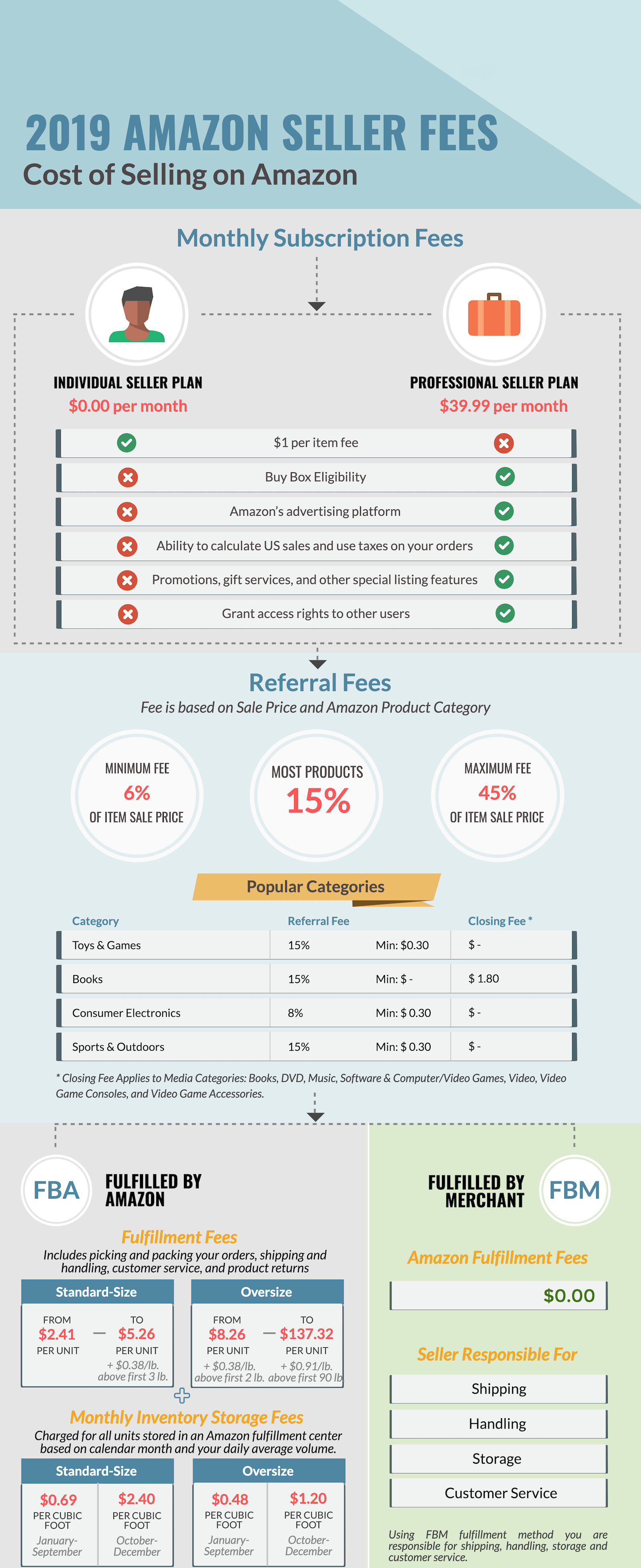 Info-graphic Credits: Supplyspy.com
Info-graphic Credits: Supplyspy.com
The info-graphic above list down all the standard fees which you will be able to calculate with the FBA fees calculator provided by Amazon. Pretty standard stuff that you will get used to.
However, let’s discuss about the hidden fees that may come as a shock to unsuspecting FBA entrepreneurs.
The Hidden Fees
- Check your Product Category

On an average, it is 15% referral fee. However some can go up to 20% if you are selling jewelry. Check it here beforehand, before you get a shock on the high referral fees. I also explained this section in greater detail here.
- Long Term Storage Fees
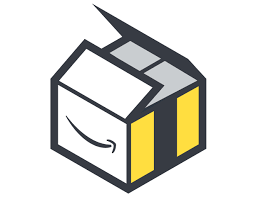
Any inventory that is stored for more than 12 months will be charged extra on top of the standard storage fees! Amazon is charging US$6.90 per cubic foot or US$0.15/unit whichever is greater per month. (Amount updated as of Feb 2019)
This can be easily avoided if you just plan your inventory well.
- Shipping to Amazon’s Fulfillment Centers
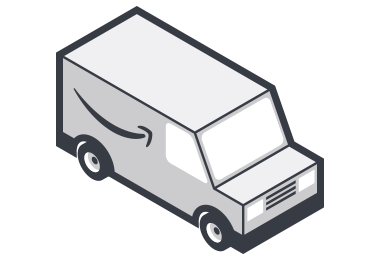
Wait a minute, doesn’t this get included into the price with Delivered Duty Paid (DDP) from my supplier? That’s only if you need to send to one fulfillment centers, but more often than not, Amazon will direct you to send to at least 3 fulfillment centers spread out all over America.
If you don’t want to split your shipment to multiple delivery locations, you can still send them to a single location. But Amazon will charge an extra US$0.20/unit to ship it out to the other fulfillment centers for you.
- Returns and Damaged Goods

Fact: You will experience a higher return rates on Amazon. This is due to Amazon’s commitment to customer’s satisfaction.
There’s is no fixed rule on the return rate as it differs from product to product. If you sell clothing, you should expect over 20% of your sales to be refunded largely due to size issues.
- Advertising and Pay-Per-Click (PPC) Fees

Not to burst your bubble, but new listings do not convert well. I have seen so many people missed this out in their cost calculation.
You will need to invest money to make more money through advertisements such as Facebook ads, giveaways, influencer fee etc. and PPC ads on Amazon.
Expect to invest a few more hundred dollars on this. ~US$500-$700
- Business Overhead Costs

Pfft! I run this alone, what kind of overhead costs can I incur?
Well, let’s name a few here for starters.
- Business Incorporation fees for the private label route (Depending on where you incorporate. In Singapore, it’s $300)
- Product Photography (~US$50-$400)
- Product Liability Insurance (Required by Amazon, but they are not enforcing it yet) (Depend on your Insurance Company and Product)
- Trademarks for your brand (US$275 for word-mark, Additional US$100-US$300 for lawyer fees)
- Sales Tax (% per unit sold by different states, get an accountant for this. US sales tax is a whole monster on its own)
- Your internet and electricity bill (Yes, include these as well. You will thank me later for some tax relief by just including this)
- Amazon may Screw up
Nobody’s perfect, especially not Amazon when they have a behemoth operation going on. Your product may get lost, accounting may be wrong, your inventory may not be displayed correctly.
Yes, Amazon will reimburse you once the error is found, but sometimes, you got to inform Amazon of the error!
We have heard stories of Amazon immediately refunding the customer for returns but sometimes they forget to pay you back!
In other stories, Amazon lost several boxes of the seller’s goods and they were reimbursed for the inventory. However 3 months later, Amazon finally found the goods and then promptly deducted the reimbursement amount from the seller’s account. 3 months worth of sales lost just like that.
Make sure you watch Amazon like a hawk!
Bonus
As you can tell from this post that getting into Amazon FBA is a steep learning curve and may deter some of you from attempting this.
Every cloud has a silver lining and selling on Amazon today is still by far one of the easiest income stream you can build together with your 9-5 job.
It is as easy as knowing your numbers always and you are already ahead of the game in this business. Remember, most Amazon sellers quit because they do not know their numbers and make huge loses, blaming Amazon and people. I’m sure you have seen some of them. Don’t be one of them.
The fact that more than 123,000 sellers are making more than US$100,000 annually on Amazon is a testimony that it is not too late and in fact, I showed that you are still in the early game right here.
Looking forward to hearing from you how your journey on Amazon is so far? Comment below.
Good luck!
